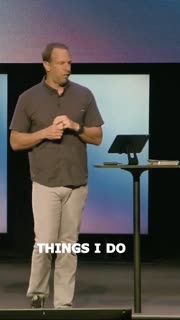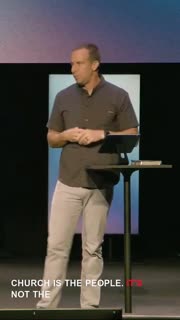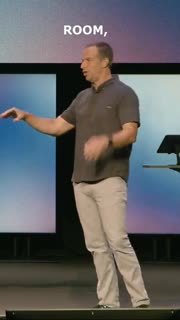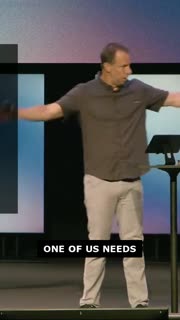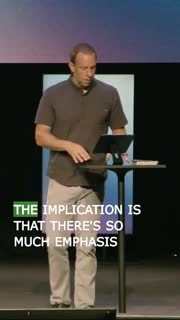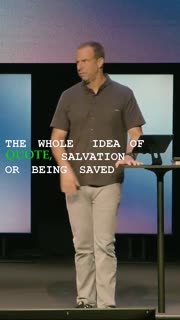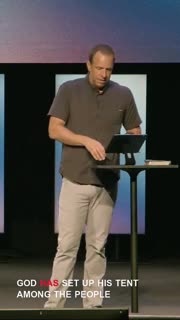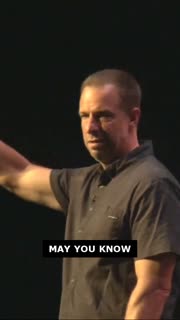Divine Rescue: Trusting God in Our Need
Devotional
Sermon Summary
Bible Study Guide
Sermon Clips
1. "One of the things I do every year is I get a little time away from the church. It's not just like I go on vacation. Part of that time is some time away with my family, and that's always part of it. But really, the point of it is every year I try to take a few weeks to kind of take a step back, hear from God, recommit my own heart to the mission that God's called me to as being the pastor here." [30:06] (21 seconds)
2. "The church is the people. It's not the buildings. It's not the facilities. It's not the program. It is the people and there are great folks here and, you know, we do not have, we do not have it figured out. If you're looking for a place that has all the answers, has it figured out, we say this every single week. We do not have it all figured out. We just realized that as a group of work in progress people, we need each other to help aim our lives at Jesus because we're going to trip and fall. We're going to screw it up and we need people to go, wait, wait, wait, let's get back on the horse together and that's what it's about." [36:32] (23 seconds)
3. "Every single person in this room, regardless of your faith tradition, regardless of what you have known or not known, however it is that you've experienced, God or the Bible or the church or Jesus or whatever, no matter what you come from, whatever your experience, whatever your experience is, all of us at some point has forgotten something crucial or critical in our lives. All of us has probably gotten stuck or lost in some way or another that was really serious, either by our own fault or because some circumstances happened to us by which we were like, we're stuck in a place or get lost." [38:29] (26 seconds)
4. "Every single one of us needs a rescue when whatever obstacle we face is bigger, more powerful, more daunting than our means of overcoming it. Every single one of us, every person, has faced an obstacle like this too that's just bigger than our own means of overcoming it. Now, some people, by the way, some people are perfectly okay going, yeah, give me a rescue. I'm stuck. Help. Some people are really perfectly okay with that. It's like part of the whole thing. I need it. Help me." [40:14] (23 seconds)
5. "The implication is that there's so much emphasis as God as a rescuer and if there is so much emphasis on God as the one who rescues, that Yahweh is salvation, God is the rescuer, that it means that people must need it from him. In the Bible, which is difficult to even, you can't even overlook this, is that people fall into a pattern over and over again in the Bible. God's people get stuck. They do something either by their own choice or by some affliction, some accident, something happens that they end up in a particular situation and they cry out, they get stuck. Somebody save me. Somebody save me." [44:15] (32 seconds)
6. "The whole idea of quote, salvation or being saved is kind of maybe in our common language the idea of being saved. But the whole idea of this language is actually really really complicated and in fact there may be more dimensions than just one singular flat definition about the idea of what it is to be saved or to have salvation. So here's what we're going to do. Over the next couple weeks we're going to do this thing. We're going to talk about the reality first of all that every single person as we've already said is in need of a rescue." [47:42] (26 seconds)
7. "Wherever God is, that's where the rescue is. Wherever God is is where the rescue is. People will go to other things and try other stuff but if there is any kind of rescue it's where God is and you see people all the time run away and come back run away and come back you want a rescue come back that's always the thing it's always the voice in fact that's the voice often of the prophets." [54:12] (20 seconds)
8. "God has set up his tent among the people the rescuing presence of God the name Jesus Yahweh is salvation literally Yeshua means God is the rescue God has come and he has set up his tent among his people to say it differently wherever God is is where the rescue is and wherever Jesus is is where God is the whole Bible is pulling that message forward when it comes to the subject of the idea of rescue where salvation pulls right into this idea wherever God is is where the rescue is wherever Jesus is is where God is Yahweh is salvation has come come." [59:22] (36 seconds)
9. "In our own effort to try to figure out how to save ourselves, we often come up against obstacles that are way bigger than us and we need you. And so we confess that. For the things that we know that we need help from, we confess that we need help. And for the things we cry out for help, and for those things that we are trying to handle on our own that are way bigger than us, we just confess our own sort of ineptness with that. Father, we're grateful that you're a rescuing God who comes to dwell among us." [01:04:37] (28 seconds)
10. "May you know that it is God who sees you, who hears you, who responds for the areas of your life where you're not sure. May God meet you in a powerful way, surprising you even. Wherever it is that you're encountering sorrow or sadness or despair, might you have the confidence to cry out, somebody save me, that God might hear you because God is the rescue. That's the name Jesus. May the love of the Father and the grace of the Son and the fellowship and comfort of the Holy Spirit be among you all in Jesus name." [01:11:19] (33 seconds)
Ask a question about this sermon
2. "The church is the people. It's not the buildings. It's not the facilities. It's not the program. It is the people and there are great folks here and, you know, we do not have, we do not have it figured out. If you're looking for a place that has all the answers, has it figured out, we say this every single week. We do not have it all figured out. We just realized that as a group of work in progress people, we need each other to help aim our lives at Jesus because we're going to trip and fall. We're going to screw it up and we need people to go, wait, wait, wait, let's get back on the horse together and that's what it's about." [36:32] (23 seconds)
3. "Every single person in this room, regardless of your faith tradition, regardless of what you have known or not known, however it is that you've experienced, God or the Bible or the church or Jesus or whatever, no matter what you come from, whatever your experience, whatever your experience is, all of us at some point has forgotten something crucial or critical in our lives. All of us has probably gotten stuck or lost in some way or another that was really serious, either by our own fault or because some circumstances happened to us by which we were like, we're stuck in a place or get lost." [38:29] (26 seconds)
4. "Every single one of us needs a rescue when whatever obstacle we face is bigger, more powerful, more daunting than our means of overcoming it. Every single one of us, every person, has faced an obstacle like this too that's just bigger than our own means of overcoming it. Now, some people, by the way, some people are perfectly okay going, yeah, give me a rescue. I'm stuck. Help. Some people are really perfectly okay with that. It's like part of the whole thing. I need it. Help me." [40:14] (23 seconds)
5. "The implication is that there's so much emphasis as God as a rescuer and if there is so much emphasis on God as the one who rescues, that Yahweh is salvation, God is the rescuer, that it means that people must need it from him. In the Bible, which is difficult to even, you can't even overlook this, is that people fall into a pattern over and over again in the Bible. God's people get stuck. They do something either by their own choice or by some affliction, some accident, something happens that they end up in a particular situation and they cry out, they get stuck. Somebody save me. Somebody save me." [44:15] (32 seconds)
6. "The whole idea of quote, salvation or being saved is kind of maybe in our common language the idea of being saved. But the whole idea of this language is actually really really complicated and in fact there may be more dimensions than just one singular flat definition about the idea of what it is to be saved or to have salvation. So here's what we're going to do. Over the next couple weeks we're going to do this thing. We're going to talk about the reality first of all that every single person as we've already said is in need of a rescue." [47:42] (26 seconds)
7. "Wherever God is, that's where the rescue is. Wherever God is is where the rescue is. People will go to other things and try other stuff but if there is any kind of rescue it's where God is and you see people all the time run away and come back run away and come back you want a rescue come back that's always the thing it's always the voice in fact that's the voice often of the prophets." [54:12] (20 seconds)
8. "God has set up his tent among the people the rescuing presence of God the name Jesus Yahweh is salvation literally Yeshua means God is the rescue God has come and he has set up his tent among his people to say it differently wherever God is is where the rescue is and wherever Jesus is is where God is the whole Bible is pulling that message forward when it comes to the subject of the idea of rescue where salvation pulls right into this idea wherever God is is where the rescue is wherever Jesus is is where God is Yahweh is salvation has come come." [59:22] (36 seconds)
9. "In our own effort to try to figure out how to save ourselves, we often come up against obstacles that are way bigger than us and we need you. And so we confess that. For the things that we know that we need help from, we confess that we need help. And for the things we cry out for help, and for those things that we are trying to handle on our own that are way bigger than us, we just confess our own sort of ineptness with that. Father, we're grateful that you're a rescuing God who comes to dwell among us." [01:04:37] (28 seconds)
10. "May you know that it is God who sees you, who hears you, who responds for the areas of your life where you're not sure. May God meet you in a powerful way, surprising you even. Wherever it is that you're encountering sorrow or sadness or despair, might you have the confidence to cry out, somebody save me, that God might hear you because God is the rescue. That's the name Jesus. May the love of the Father and the grace of the Son and the fellowship and comfort of the Holy Spirit be among you all in Jesus name." [01:11:19] (33 seconds)
